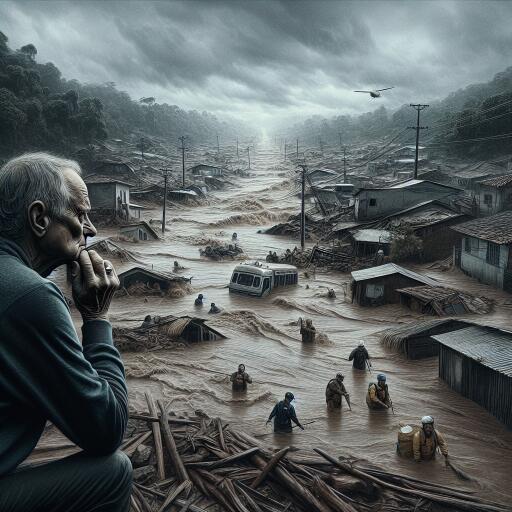
Unprecedented Floods Ravage Southern Brazil, Leaving a Trail of Destruction
The recent deluge in Rio Grande do Sul, a southern state in Brazil, has resulted in a devastating toll: 39 lives claimed, with another 68 individuals reported missing. This catastrophic event has been marked as the state’s worst flooding in nearly 80 years, surpassing the destruction previously recorded in a historical flood back in 1941. As this calamity unfolds, it underscores a year scarred by environmental disasters, with similar events having occurred in July, September, and November of 2023, cumulatively taking 75 lives prior to this tragedy.
The magnitude of these floods has been staggering, with certain locales experiencing water levels not witnessed since records commenced almost a century and a half ago. This disaster has dramatically impacted the town of Feliz, situated approximately 50 miles from Porto Alegre, the state capital. Here, a bridge linking Feliz to the neighboring city of Linha Nova was obliterated by the surging waters, exemplifying the sheer force of this natural disaster.
As the floodwaters surged, basic services were severely disrupted. The state reported widespread outages of electricity, communication networks, and water supply, leaving over 23,000 residents without homes and struggling to communicate their status to loved ones in distant locations. This situation has been exacerbated by a lack of access to internet, telephone services, and electricity, rendering updates and information sharing a daunting challenge.
The onset of these torrential rains began on a Monday and predictions by Marcelo Seluchi, chief meteorologist at the National Centre for Monitoring and Alerts of Natural Disasters, indicated that the harsh weather was expected to persist until at least Saturday. In response to the escalating crisis, Governor Eduardo Leite issued a warning to the state’s inhabitants, emphasizing the anticipated worsening situation in Porto Alegre and surrounding areas. He reassured the public of the government’s steadfast resolve to navigate through this disaster.
This year’s weather anomalies in South America, including the floods ravaging Brazil’s southern region, have been influenced significantly by El Nino. This climate pattern, characterized by the warming of surface waters in the Equatorial Pacific, traditionally induces droughts in Brazil’s northern regions while escalating rainfall in the south. However, the impacts of this year’s El Nino have been exceptionally severe, contributing to a record drought in the Amazon as well as the unprecedented rainfall leading to the current flooding.
Experts are pointing to human-caused climate change as a key factor behind the increasing frequency of extreme weather events. This recent disaster in Rio Grande do Sul not only serves as a sobering reminder of climate change’s immediate impacts but also as a call to action for addressing the underlying causes contributing to these increasingly severe weather patterns.
As the state of Rio Grande do Sul commences its recovery efforts from this severe blow, the resilience of its people and the support from the broader community will be crucial to overcoming the aftermath of these record-breaking floods. The event is a stark indicator of our times, where the signs of climate change are becoming ever more apparent and the need for sustainable human-environmental interactions more urgent.





Leave a Reply